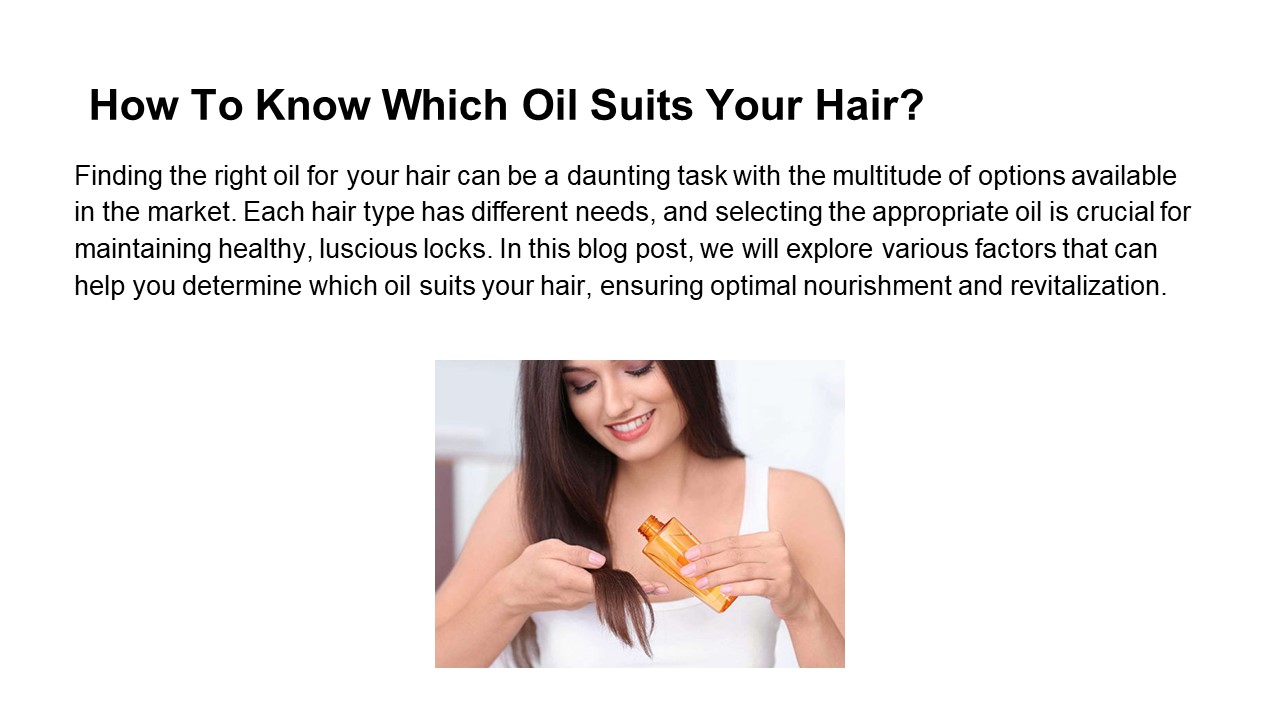How To Know Which Oil Suits Your Hair?
Title:
How To Know Which Oil Suits Your Hair?
Description:
Finding the right oil for your hair can be a daunting task with the multitude of options available in the market. Each hair type has different needs, and selecting the appropriate oil is crucial for maintaining healthy, luscious locks. In this blog post, we will explore various factors that can help you determine which oil suits your hair, ensuring optimal nourishment and revitalization. –
Number of Views:0
Title: How To Know Which Oil Suits Your Hair?
1
How To Know Which Oil Suits Your Hair?
- Finding the right oil for your hair can be a
daunting task with the multitude of options
available in the market. Each hair type has
different needs, and selecting the appropriate
oil is crucial for maintaining healthy, luscious
locks. In this blog post, we will explore various
factors that can help you determine which oil
suits your hair, ensuring optimal nourishment and
revitalization.
2
Understanding Your Hair Type Before delving into
the world of organic hair oil, it's important to
understand your hair type. Hair can be
categorized into several types, such as oily,
dry, normal, curly, or straight. Different hair
types have distinct requirements, and identifying
your specific hair type will aid in selecting the
most suitable oil. Essential Oils for Different
Hair Types 1)Oily Hair If you have oily hair,
lighter oils such as jojoba oil or grapeseed oil
are recommended. These oils are non-greasy and
won't weigh down your hair. They help regulate
sebum production and balance the scalp's natural
oils. 2)Dry Hair For dry hair, heavier oils like
coconut oil, argan oil, or avocado oil are ideal
choices. These oils penetrate deeply into the
hair shaft, moisturizing and nourishing dry and
damaged hair.
3)Normal Hair If your hair falls into the
normal category, you have the flexibility to
experiment with a wide range of oils. Almond oil,
olive oil, or sesame oil can work well for
maintaining your hair's health and shine.
3
4)Curly or Frizzy Hair Curly or frizzy hair
requires extra hydration and moisture. Oils such
as castor oil, shea butter, or macadamia oil can
help tame frizz and define curls. Look for oils
that provide hydration without weighing down your
curls. Factors to Consider In addition to hair
type, other factors to consider when selecting
organic hair oil include 1)Scalp Health If you
have specific scalp concerns like dandruff or
itching, opt for oils with antimicrobial and
anti-inflammatory properties. Tea tree oil,
lavender oil, or elixir hair oil can soothe the
scalp and promote a healthy environment for hair
growth. 2)Hair Goals Identify your hair goals,
whether it's improving hair growth, reducing hair
fall, enhancing shine, or combating split ends.
4
3)Allergies and Sensitivities Be mindful of any
allergies or sensitivities you may have to
certain oils. Perform a patch test before
applying any new oil to your hair and scalp to
avoid potential adverse reactions. Experimentatio
n and Consistency Finding the perfect herbal
hair oil might require some trial and error.
Consistency is key when it comes to reaping the
benefits of herbal hair oil, so make sure to
incorporate them into your regular hair care
routine. Choosing the right elixir hair oil for
your hair is essential for maintaining its
health, luster, and vitality. By considering your
hair type, scalp health, and hair goals, you can
narrow down the options and find the oil that
suits you best. Remember to embrace
experimentation and stay consistent with your
chosen oil to achieve the desired results. With
the right oil, you'll be on your way to
nourished, gorgeous hair that turns heads
wherever you go.































